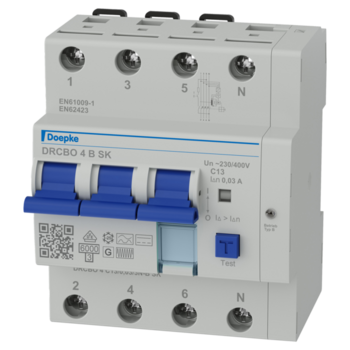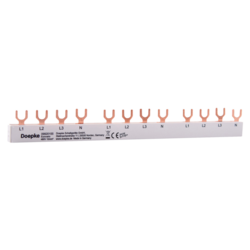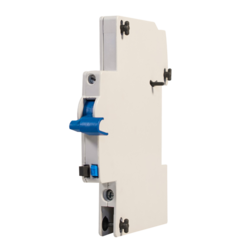residual current operated circuit-breakers with integral overcurrent protection DRCBO 4 C13/0,03/3N-B SK
- AC-DC sensitive up to 150 kHz
- higher system availability: short-time delayed
- VDE certified


residual current operated circuit-breakers with integral overcurrent protection DRCBO 4 C13/0,03/3N-B SK
- AC-DC sensitive up to 150 kHz
- higher system availability: short-time delayed
- VDE certified
Details
Residual current operated circuit-breaker with integral overcurrent protection, three-pole+N, 13 A, 0,03 A, C-characteristic, Type B, short-time delayed
RCBOs combine residual current and miniature circuit-breakers in a single device (RCBO). They protect people against residual currents and systems against short-circuit and overload. The DRCBO 4 have a rated switching capacity of 6 kA. They provide a labelling area in addition to the tripping indicator. Type B switches are AC-DC sensitive at frequencies of 0 Hz (smooth residual currents) to 150 kHz. They have increased resistance to surge currents and lightning. Switches with the characteristic curve SK ensure fault protection and a high system availability. They are characterised by a lower response sensitivity at higher frequencies. This means that system-related nuisance tripping is largely prevented. The characteristic curve SK is optimised for systems in which no fire protection is required. Switches with tripping characteristic C are optimised for electric circuits with high inrush or peak currents. Standard switches are designed for electric circuits with a rated voltage of 230 V or 400 V and a rated frequency of 50 Hz.
AC/DC sensitive for residual currents with frequencies of 0 Hz (smooth direct current) up to 150 kHz, mains-voltage-independent tripping when type A residual currents occur, compact design for all rated currents, switch position indicator, separate indication of tripping cause, strain-relief clamps with a wide terminal cross-section range on both connection sides, neutral conductor right, labelling area
quick fastening to mounting rail, any installation position, supply preferably from above
commercial and industrial installations with TT, TN-S and TN-C-S systems, where power electronics equipment is used without galvanic isolation from the mains, e.g. frequency converters, switching power supplies, high-frequency converters, photovoltaic installations and UPS equipment with frequency converters without transformers, Type B+ and type B RCBOs with characteristic curve NK should be used where fire protection is legally required.
suitable for use in 50 Hz AC networks, RCBOs are also available for other frequencies upon request, not designed for use in direct current networks or on the output side of controlled electrical equipment such as frequency converters
- Operating instructions
- Data sheet
- Prospectus Circuit-breaker overview
- Technical information derating graph
- Text for invitation to tender RTF
- Text for invitation to tender GAEB XML
- Text for invitation to tender GAEB 2000
- Text for invitation to tender GAEB 90
- Dimensional drawing Group view
- STEP file
- Wiring diagram
- Characteristic B SK 30 mA
Residual current operated circuit-breaker with integral overcurrent protection, three-pole+N, 13 A, 0,03 A, C-characteristic, Type B, short-time delayed
RCBOs combine residual current and miniature circuit-breakers in a single device (RCBO). They protect people against residual currents and systems against short-circuit and overload. The DRCBO 4 have a rated switching capacity of 6 kA. They provide a labelling area in addition to the tripping indicator. Type B switches are AC-DC sensitive at frequencies of 0 Hz (smooth residual currents) to 150 kHz. They have increased resistance to surge currents and lightning. Switches with the characteristic curve SK ensure fault protection and a high system availability. They are characterised by a lower response sensitivity at higher frequencies. This means that system-related nuisance tripping is largely prevented. The characteristic curve SK is optimised for systems in which no fire protection is required. Switches with tripping characteristic C are optimised for electric circuits with high inrush or peak currents. Standard switches are designed for electric circuits with a rated voltage of 230 V or 400 V and a rated frequency of 50 Hz.
AC/DC sensitive for residual currents with frequencies of 0 Hz (smooth direct current) up to 150 kHz, mains-voltage-independent tripping when type A residual currents occur, compact design for all rated currents, switch position indicator, separate indication of tripping cause, strain-relief clamps with a wide terminal cross-section range on both connection sides, neutral conductor right, labelling area
quick fastening to mounting rail, any installation position, supply preferably from above
commercial and industrial installations with TT, TN-S and TN-C-S systems, where power electronics equipment is used without galvanic isolation from the mains, e.g. frequency converters, switching power supplies, high-frequency converters, photovoltaic installations and UPS equipment with frequency converters without transformers, Type B+ and type B RCBOs with characteristic curve NK should be used where fire protection is legally required.
suitable for use in 50 Hz AC networks, RCBOs are also available for other frequencies upon request, not designed for use in direct current networks or on the output side of controlled electrical equipment such as frequency converters
- Operating instructions
- Data sheet
- Prospectus Circuit-breaker overview
- Technical information derating graph
- Text for invitation to tender RTF
- Text for invitation to tender GAEB XML
- Text for invitation to tender GAEB 2000
- Text for invitation to tender GAEB 90
- Dimensional drawing Group view
- STEP file
- Wiring diagram
- Characteristic B SK 30 mA


